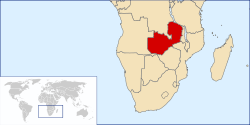North Rhodesia
| Northern Rhodesia | ||||||||||
| Protectorate of the United Kingdom | ||||||||||
|
||||||||||
|
||||||||||
|
Anthem "God Save the King/Queen" |
||||||||||
|
Location of Northern Rhodesia in Southern Africa.
|
||||||||||
| Capital |
Livingstone (until 1935) Lusaka (from 1935) |
|||||||||
| Languages | English (official) Nyanja, Bemba, Tonga and Lozi widely spoken |
|||||||||
| Government | Protectorate | |||||||||
| Governor | ||||||||||
| • | 1924–1927 | Sir Herbert Stanley | ||||||||
| • | 1959–1964 | Sir Evelyn Hone | ||||||||
| Prime Minister | ||||||||||
| • | 1964 | Kenneth Kaunda | ||||||||
| Historical era | Interwar period · Cold War | |||||||||
| • | Company rule | 1911 | ||||||||
| • | British protectorate | 1 April 1924 | ||||||||
| • | Federated with S. Rhodesia and Nyasaland |
1953–1963 |
||||||||
| • | Independence | 24 October 1964 | ||||||||
| Currency | Southern Rhodesian pound | |||||||||
|
||||||||||
| Today part of |
|
|||||||||
Northern Rhodesia was a protectorate in south central Africa, formed in 1911 by amalgamating the two earlier protectorates of Barotziland-North-Western Rhodesia and North-Eastern Rhodesia. It was initially administered, as were the two earlier protectorates, by the British South Africa Company, (BSAC), a chartered company on behalf of the British government. From 1924 it was administered by the British government as a protectorate under similar conditions to other British-administered protectorates, and the special provisions required when it was administered by BSAC were terminated.
Although under the BSAC charter it had features of a charter colony, the BSAC's treaties with local rulers and British legislation gave it the status of a protectorate. The territory attracted a relatively small number of European settlers, but from the time these first secured political representation, they agitated for white minority rule, either as a separate entity or associated with Southern Rhodesia and possibly Nyasaland. The mineral wealth of Northern Rhodesia made full amalgamation attractive to Southern Rhodesian politicians, but the British government preferred a looser association to include Nyasaland. This was intended to protect Africans in Northern Rhodesia and Nyasaland from discriminatory Southern Rhodesian laws. The Federation of Rhodesia and Nyasaland formed in 1953 was intensely unpopular among the African majority and its formation hastened calls for majority rule. As a result of this pressure, the country became independent in 1964 as Zambia.
The geographical, as opposed to political, term "Rhodesia" referred to a region generally comprising the areas that are today Zambia and Zimbabwe. From 1964 it only referred to the former Southern Rhodesia.
...
Wikipedia



